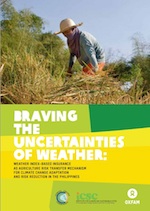Braving the Uncertainties of Weather: Weather index-based insurance as agriculture risk transfer mechanism for climate change adaptation and risk reduction in the Philippines

This paper scoped three pilot models of weather index-based insurance (WII) that are initiated separately by both the private sector and by PCIC (as part of ILO-supported project on innovative agricultural financing). The early experiences of different stakeholders who have piloted and implemented WII in the country have shown that it can be an effective risk transfer instrument that can complement other proactive climate change adaptation and disaster risk reduction strategies. While WII is doable at the pilot level, there are requirements, challenges, and barriers that need to be addressed before WII can be sustained in the long run and to be implemented on a wide scale as an agricultural risk transfer scheme and a climate change adaptation tool. This paper also explores possible action points for the key stakeholders (mainly government agencies, local government units (LGUs), private sector and civil society organizations (CSOs) in implementing this risk transfer instrument; and the policy environment needed for WII to be an effective tool for disaster risk management and climate change adaptation for the AFF sector.